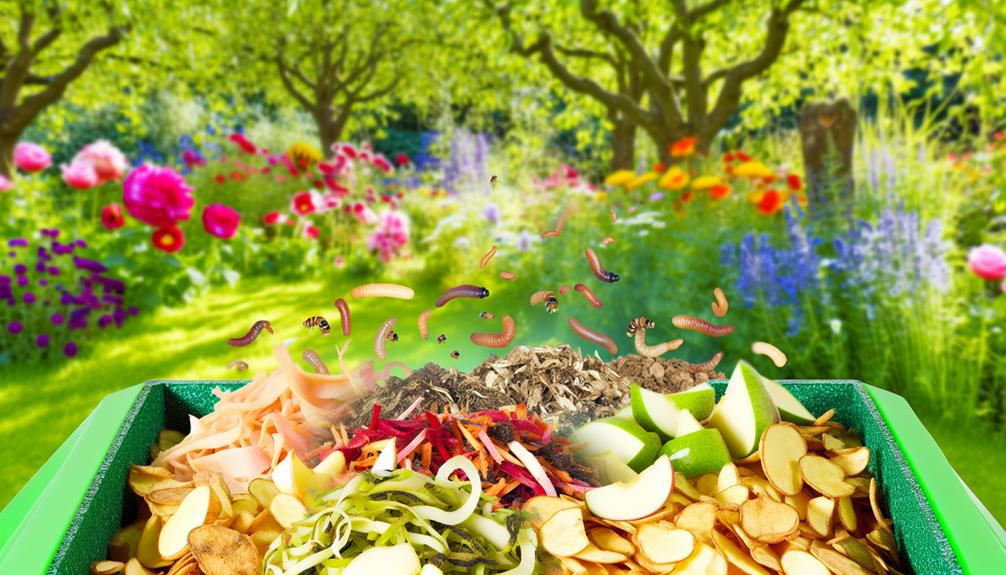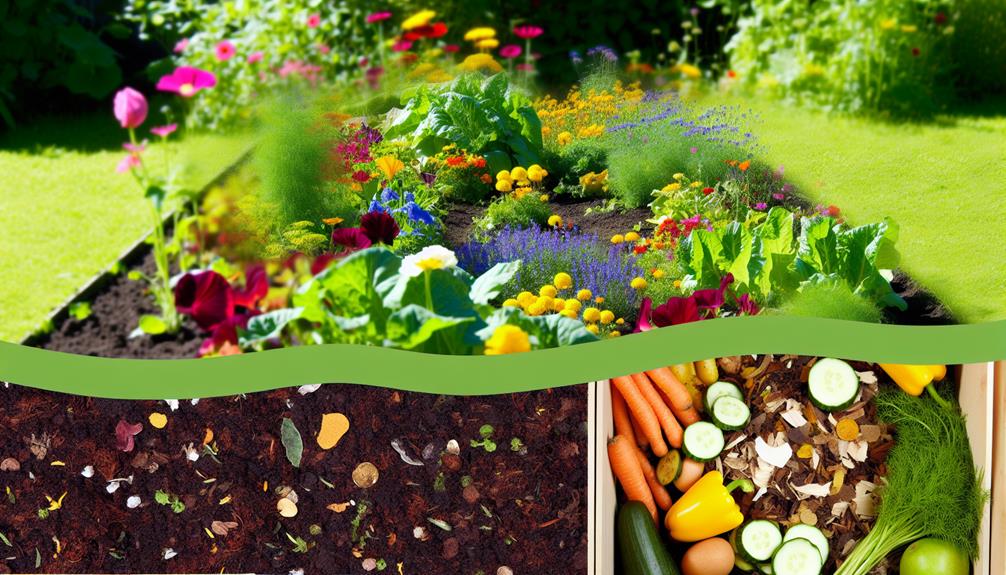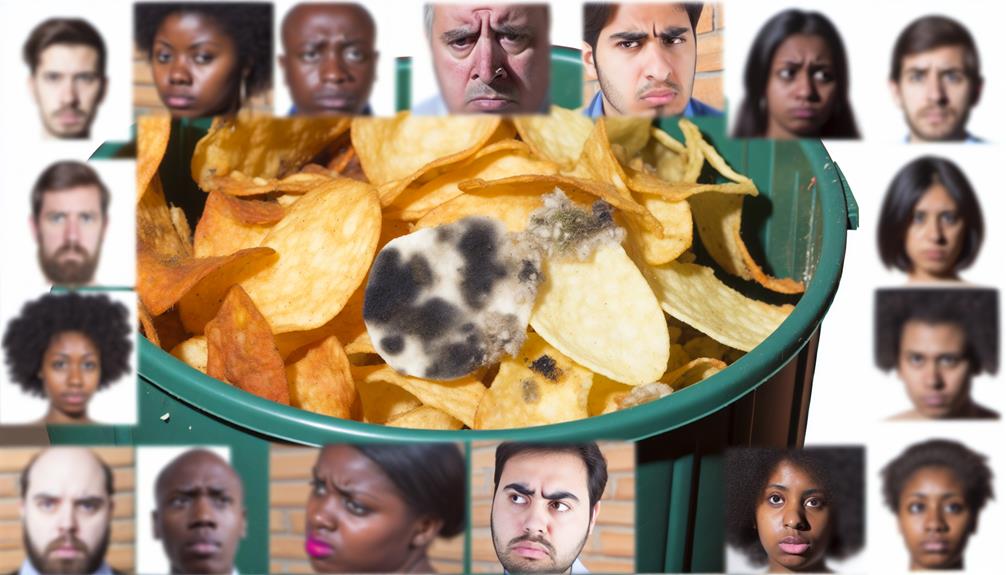

You can compost chips, but there are some things to keep in mind. Chips like potato, tortilla, and vegetable chips break down naturally, but you should avoid those with greasy or non-organic coatings. Organic chips are preferred as they lack synthetic additives. To minimize pests and odors, bury the chips and balance your compost pile with other materials.
Remember to turn your compost regularly to maintain proper aeration and moisture. Properly composted chips contribute to soil enrichment and waste reduction. With careful management, you can effectively turn your leftover chips into a beneficial compost. Keep going for more detailed advice on composting techniques.
When delving into composting chips, understanding the different types you can use is crucial. Chips come in various forms, and grasping these can help you make better composting decisions.
Let’s explore the chip varieties and snack types you might encounter.
First, consider potato chips, one of the most common snack types. These are usually thinly sliced, fried, and salted. Tortilla chips, made from corn, are another popular variety. Both of these can be composted, but it’s important to remember that their salt and oil content might slow down the composting process.
Next, you have vegetable chips, which include those made from kale, beetroot, and sweet potato. These tend to break down quicker due to their natural composition. Rice and lentil chips, often marketed as healthier options, can also be composted and usually have fewer additives.
Also Read: Can You Compost Bread Crumbs?
Choosing between organic and non-organic chips for composting can greatly impact the quality and health of your compost. Organic chips are made from ingredients sourced without synthetic pesticides or fertilizers, which means fewer chemical additives enter your compost pile. This naturally aligns with a community focused on sustainability and eco-friendly practices. When you add organic chips, you’re ensuring that your compost remains as natural and clean as possible.
On the other hand, non-organic chips might contain chemical additives and preservatives that could potentially disrupt the composting process. These additives mightn’t break down fully, leaving residues that can harm soil health and the plants you eventually grow. So, if you’re committed to creating a healthy compost, it’s wise to choose organic options whenever possible.
Ingredient sourcing plays an important role here. By opting for chips made from organically grown ingredients, you support farming practices that are better for the environment. This not only benefits your compost but also promotes a sense of community among like-minded individuals who value sustainability.
Composting offers substantial benefits, including reducing household waste and enriching soil quality. When you compost your food scraps, you’re not just cutting down on the waste that ends up in landfills; you’re also creating a nutrient-rich amendment for your garden. This helps promote soil enrichment, making your plants healthier and more resilient.
Think of compost as a natural fertilizer that boosts the organic matter in your soil, improving its structure and water retention capabilities.

By engaging in composting, you contribute to waste reduction. Each time you add kitchen scraps or yard waste to your compost bin, you’re diverting materials from the waste stream. This collective effort can greatly impact environmental health by decreasing the amount of methane produced in landfills. Methane is a potent greenhouse gas, and reducing its presence is essential for combating climate change.
To get started, simply collect your organic waste, such as vegetable peels and coffee grounds. Layer these with yard clippings and keep the pile moist but not soggy. Turn it regularly to aerate the compost and speed up decomposition. In a few months, you’ll have a valuable resource that benefits both your garden and the planet.
Also Read: Can You Compost Body Wash?
Despite its numerous benefits, composting does come with a few potential drawbacks that you should consider. One major concern is pest attraction. When you add chips, especially those with oils and flavors, they can become a magnet for rodents, insects, and other unwanted critters. To minimize this, make sure to bury the chips deep within the compost pile and cover them with plenty of brown materials like leaves or cardboard.
Another issue you might face is odor problems. Chips, particularly the flavored ones, can emit strong smells as they break down. This can be unpleasant and might deter you from continuing your composting efforts. To combat odor issues, balance your compost pile with equal parts of green and brown materials. Turning the pile regularly will also help aerate it and reduce any foul smells.
While these drawbacks exist, they shouldn’t discourage you from composting chips. With some careful management, you can mitigate these problems and still reap the benefits of composting.
To prepare chips for composting, start by breaking them into smaller pieces to accelerate the decomposition process. This simple step guarantees they break down more quickly in your compost pile.
If you’ve been accumulating chips, take them out of chip storage and sort through them. Make sure to remove any chips that are excessively greasy or have non-organic coatings, as these can hinder the composting process.
Once you’ve sorted and broken down the chips, consider their chip usage in your compost system. Chips, especially those made from potatoes or corn, can provide a good source of carbon, balancing out the nitrogen-rich materials like vegetable scraps and grass clippings. However, moderation is key. Too many chips can create a dense, compact layer that may slow down aeration and microbial activity.
After breaking and sorting, mix the chips with other compost ingredients to improve airflow and promote even decomposition.
Keep an eye on moisture levels; chips can sometimes absorb a lot of moisture, which might dry out the compost. By managing chip storage effectively and integrating their usage thoughtfully, you’ll contribute positively to your compost’s health and efficiency.
Mastering different composting techniques can greatly enhance the efficiency and quality of your compost. First, choose the right compost bin that suits your needs. For backyard composting, a simple bin with a lid works well. If space is limited, consider a compact bin for indoor use.
Next, focus on compost aeration. Proper aeration guarantees that your compost pile gets enough oxygen, which is essential for microbial activity. Regularly turning your compost, using a pitchfork or a compost aerator tool, helps maintain good air flow. If you prefer a low-maintenance option, a compost tumbler can simplify the process, as it’s designed to be turned easily.
Layering is another technique to maximize efficiency. Alternate between green materials, like fruit and vegetable scraps, and brown materials, such as dried leaves and cardboard. This balance ensures a steady decomposition process.
Monitoring moisture levels is equally important. Your compost should be as damp as a wrung-out sponge. If it’s too dry, add water. If it’s too wet, add more brown materials to absorb excess moisture.
Also Read: Can You Compost Baking Soda?

When composting chips, watch out for common mistakes that can hinder your composting success.
Avoid adding greasy chips, as they can attract pests and slow decomposition.
Also, be sure to remove chip packaging and don’t overload your compost bin with too many chips at once.
One common mistake when composting is adding greasy chips, which can disrupt the balance of your compost pile. Grease absorption is limited in compost, leading to issues in decomposition rate. Grease creates an anaerobic environment, slowing down the composting process and causing unpleasant odors.
To help visualize the impact of grease on your compost, consider the following table:
| Issue | Impact on Compost Pile |
|---|---|
| Grease absorption | Limited, leading to pooling |
| Decomposition rate | Slows down due to anaerobic conditions |
| Odor production | Increases, causing unpleasant smells |
When you add greasy chips, the fats don’t break down easily. Instead, they create a barrier that prevents oxygen from reaching other materials, essential for a healthy compost. This imbalance can attract pests and make the pile less effective.
To avoid this, you should either pre-treat the chips by blotting excess grease or incorporate more browns (carbon-rich materials) like leaves or cardboard, which can help absorb some of the grease. Remember, a well-balanced compost pile fosters a sense of community and shared responsibility in maintaining a sustainable environment.
Overlooking chip packaging in your compost pile can lead to significant contamination and hinder the composting process. It’s easy to toss the whole bag in without a second thought, but not all chip packaging is created equal.
Most chip bags are made from a mix of materials, including plastic and aluminum, which aren’t compostable. When you’re sorting your compost, always check if the chip packaging is labeled as compostable packaging.
Some chip brands offer compostable packaging, but it’s essential to verify this before adding it to your pile. Look for clear labeling or consult the brand’s website for confirmation. If it’s not explicitly stated as compostable, it’s best to discard it in the trash to avoid any issues.
Piling too many chips into your compost can disrupt the balance and slow down the decomposition process. When you add excessive amounts of chips, you risk creating a compost overload. This imbalance can lead to compost saturation, where your pile becomes too wet or dense, making it difficult for air to circulate.
Efficient composting relies on a mix of green (nitrogen-rich) and brown (carbon-rich) materials. Chips fall under the brown category, so if you add too many, you need to balance them with green materials like vegetable scraps or grass clippings.
To avoid compost overload, monitor the ratio of materials you’re adding. A good rule of thumb is to maintain a 2:1 ratio of greens to browns. Turn your compost regularly to ensure proper aeration. This practice helps break down materials faster and prevents compost saturation.
If you notice your compost pile isn’t breaking down as expected, you might be overloading it with chips. Reduce the amount you’re adding and mix in more greens. By maintaining the right balance, you secure a healthy composting process that benefits your garden and the environment.
When you’re considering chip decomposition, expect compost breakdown to take several months. The exact time varies, but with proper aeration and moisture, you’ll see results in three to six months, fostering a sense of sustainability and community.
When considering specific chip brands for composting, look for organic brands that use eco-friendly packaging. You’ll feel good knowing you’re making a sustainable choice and contributing to a community that values environmental responsibility.
Yes, flavored chips can affect compost quality due to flavoring chemicals. They might disrupt the nutrient balance, making your compost less effective. Stick to plain, natural chips to keep your compost healthy and thriving.
You’re wondering if it’s safe to compost chips with mold on them. It’s generally fine, but you should take some precautions. Compost mold might affect mold safety, so wear gloves and guarantee proper aeration in your compost.
Yes, composted chips can attract pests or animals to the compost pile. To guarantee pest prevention, regularly turn your compost and cover food scraps with brown materials like leaves or straw. You’ll keep your compost healthy and community-friendly.
In summary, you can compost chips, but it’s important to know their type and preparation. Organic chips are ideal, while non-organic ones may need more scrutiny.
Follow proper composting techniques and avoid common mistakes like adding too many chips or neglecting to balance with other compost materials.
By doing so, you’ll reap the benefits of enriched soil while minimizing potential drawbacks. Remember, preparation is key for successful composting—so take the time to do it right.
